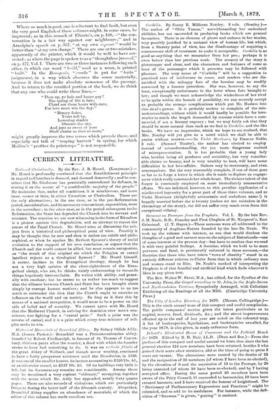CURRENT LITERATURE.
National Christianity. By the Rev. J. B. Heard. (Longmans.)— Mr. Heard is profoundly convinced that the Establishment principle in regard to Churches is doomed, and doomed deservedly ; and he con- siders that Mr. Gladstone has practically surrendered its defence, in resting it on the assent of "a considerable majority of the people." He maintains that, under all conditions, it is mischievous, and mast issue, sooner or later, in either Cxsarism or Clericalism. These are the only alternatives ; in the one case, as in the pm-Reformation period, sacerdotal ism, and its necessary concomitant, superstition, were in the ascendant ; in the other case, as in the period subsequent to the Reformation, the State has degraded the Church into its servant and minister. The reaction we are now witnessing in the form of Ritualism is a protest against this degradation, and an attempt to repeat the errors of the Papal Church. Mr. Heard aims at discussing the sub- ject from a historical and philosophical point of view. Possibly it may be thought that he now and then is rather too subtle and philo- sophical, as when he applies Mr. Herbert Spencer's theory of social evolution to the support of his own conclusion, or argues that the Church and the world cannot be allied, but must remain antagonists, as "the result of that original sin which the Pelagian or carnal intellect rejects as a theological figment." Mr. Heard himself, it seems, inclines to the Evangelical theology, though he has not a very high opinion of the clear-sightedness of the Evan- gelical clergy, who are, he thinks, vainly endeavouring to reconcile things hopelessly irreconcilable. He writes with ability, and gener- ally with candour; but he seems to us rather too much to suggest that the alliance between Church and State has been brought about simply by corrupt human motives ; and he also appears to us too much to surrender the idea that the Church ought to exercise an influence on the world and on society. So long as it does this by means of a national recognition, it would seem to be a power on the side of belief and of morality. We cannot agree with Mr. Heard that the Medizeval Church, in striving for dominion over men's con- science, was fighting for a "carnal prize." Such a prize was the reverse of carnal, and it is a prize which every true minister of reli- gion seeks to win.


































 Previous page
Previous page